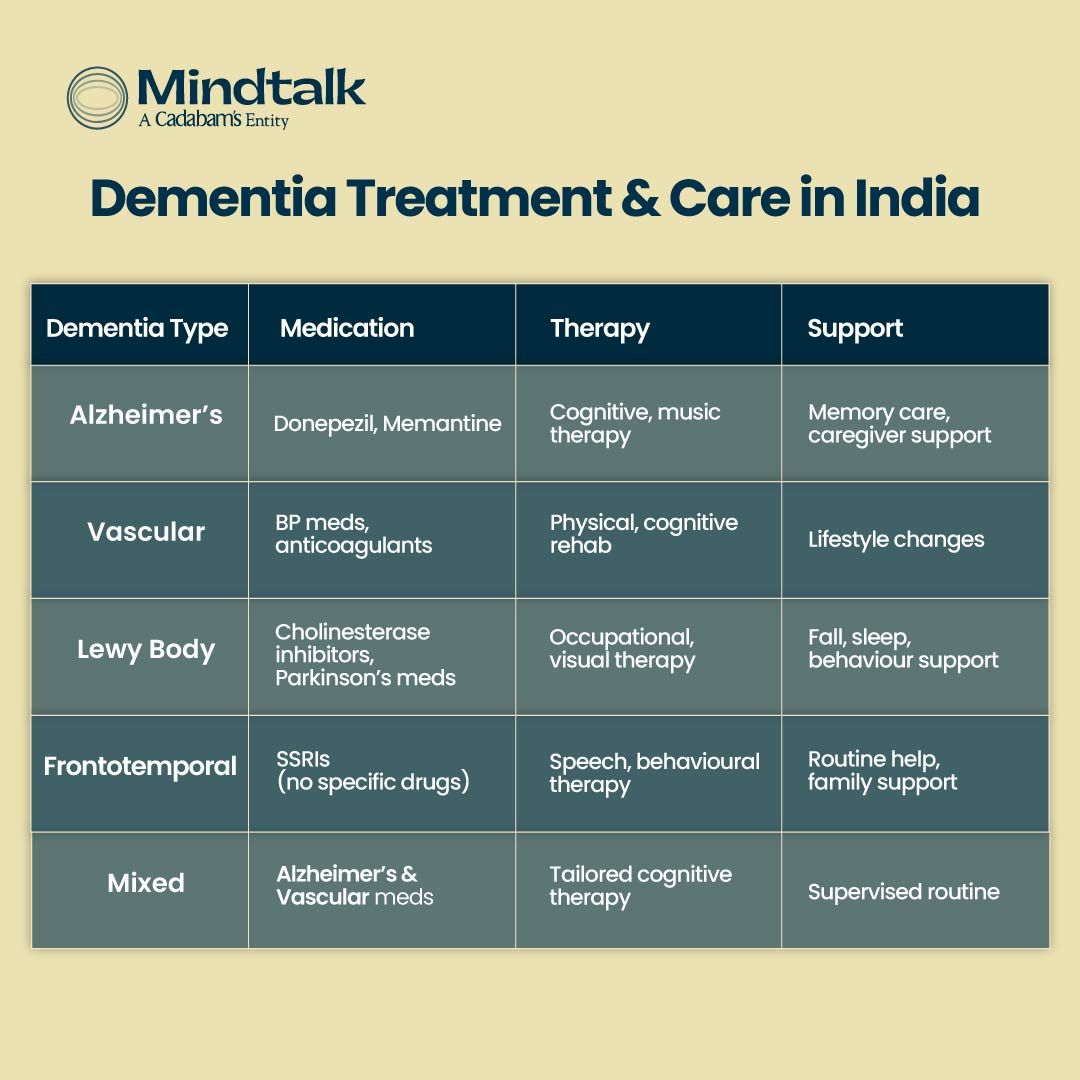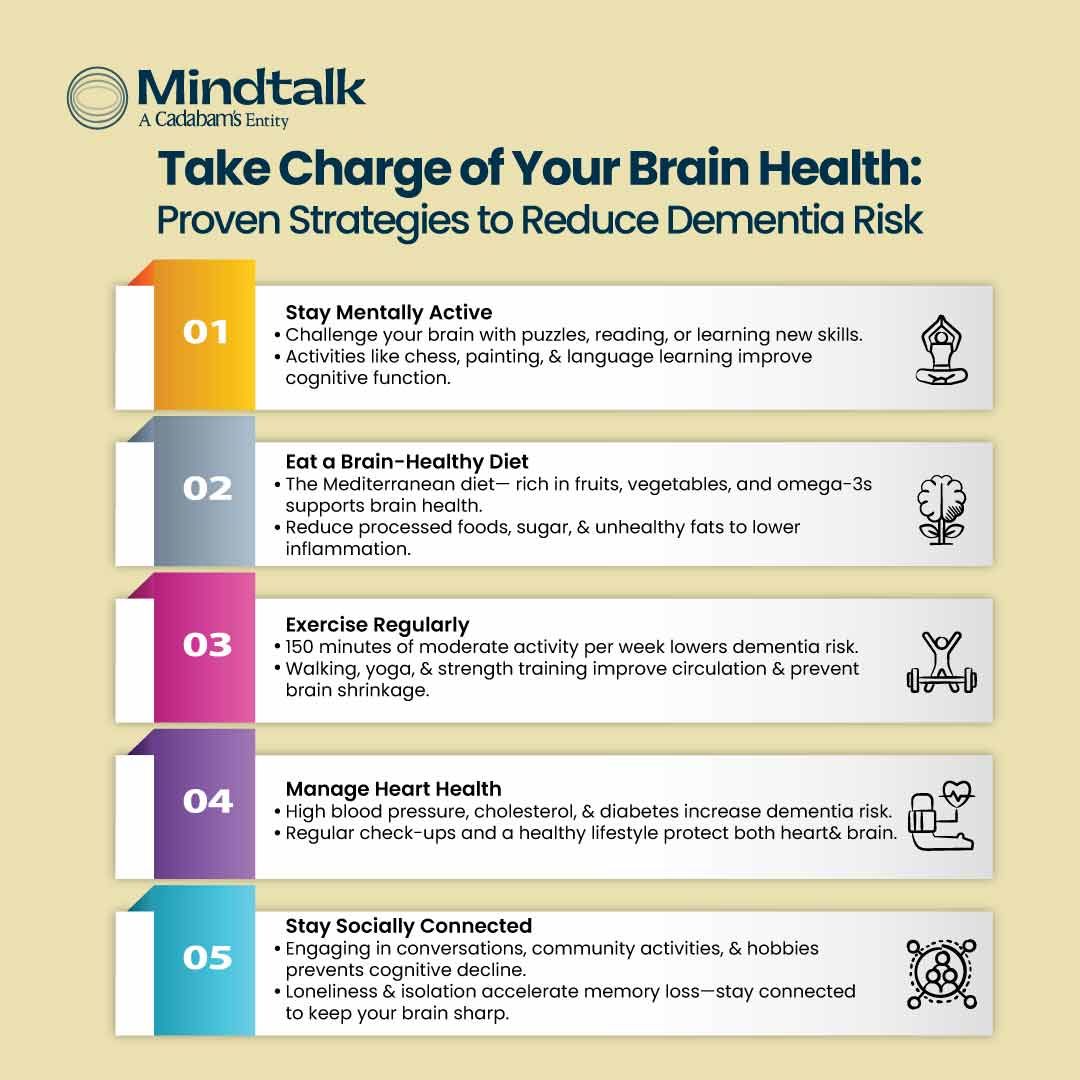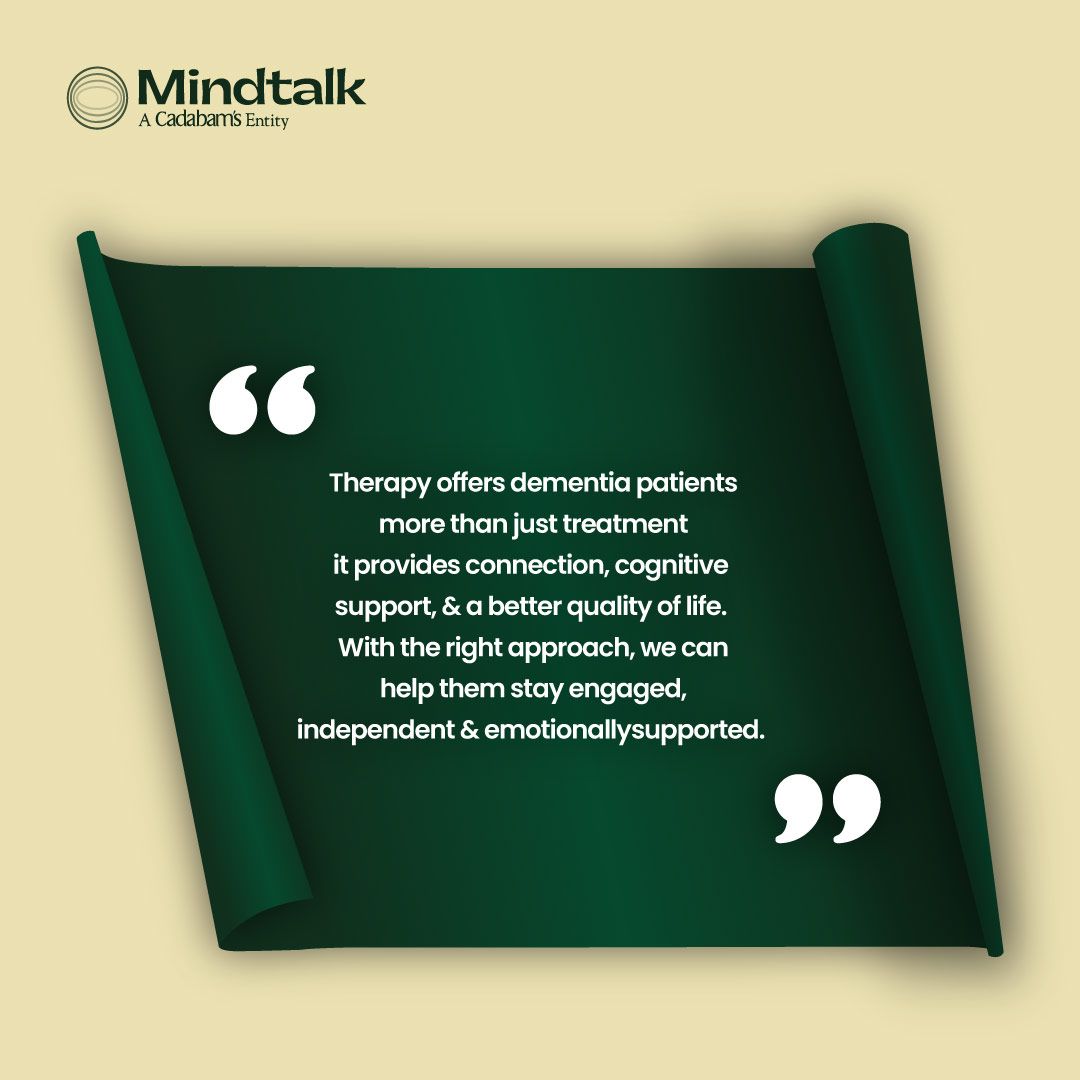Dementia: Access Quality Care For Dementia Support
Dementia is a progressive condition that affects memory, thinking and behaviour. While some decline in memory is normal with ageing, the symptoms of dementia go beyond forgetfulness and significantly affect daily life. Early diagnosis and treatment of dementia can slow its progression and improve quality of life.
What is Dementia?
Dementia is a group of symptoms linked to cognitive decline, including issues with memory, reasoning, and behaviour.
Memory loss and dementia often go hand-in-hand, affecting a person’s ability to perform everyday tasks, maintain independence, and engage meaningfully with their surroundings.
Dementia vs. Normal Ageing
Unlike normal ageing, dementia symptoms worsen over time, interfering with independence. Normal ageing may involve occasional forgetfulness, but dementia leads to persistent memory loss and confusion that disrupt daily life and relationships. Over time, these symptoms interfere with safety, personal care, and the ability to live independently.
How Dementia Affects Memory, Thinking & Behaviour
The distinction between dementia and Alzheimer’s remains important, as Alzheimer’s dementia is only one of many types of dementia. Dementia impairs memory, reasoning, and behaviour, affecting daily tasks and social interactions. It also alters personality, emotional regulation, and spatial awareness, progressively reducing the brain’s ability to process, respond, and function autonomously.
Stages of Dementia
The stages of dementia typically progress as follows:
- Mild: Subtle memory lapses, slight confusion, misplacing items
- Moderate: Noticeable memory loss, difficulty with daily tasks, mood swings
- Severe: Complete dependence, loss of communication, physical decline
Understanding the stages helps families prepare for what lies ahead, both emotionally and practically. Stages of dementia awareness supports timely care planning, allows for proactive decision-making, enables early interventions, and ensures that appropriate support systems are in place as the condition advances.
Dementia progresses in several stages, from mild forgetfulness to complete dependency on care. Recognising the early signs of dementia is crucial for timely dementia treatment.
Early-Stage Dementia
- Subtle early signs of dementia include forgetfulness, difficulty planning, and misplacing items.
- Individuals may function independently but struggle with recalling recent events and organising daily tasks.
Middle Stage Dementia
- Memory loss worsens, making it hard to recognise family members or recall recent conversations.
- Wandering, confusion, and difficulty with daily tasks require increasing support and structured dementia treatment.
Late-Stage Dementia
- Familiar faces become strangers. Confusion sets in, making once-simple tasks overwhelming.
- Dementia symptoms like wandering and memory loss make daily routines difficult, requiring more structured dementia treatment and support.
Common Types of Dementia
Dementia disease has multiple forms, each with distinct dementia symptoms, causes, and progression.
Understanding them helps with accurate dementia diagnosis and treatment decisions.
Alzheimer’s Dementia
The most common type of Dementia is Alzheimer’s which accounts for 60-80% of cases. It progresses slowly, causing short-term memory loss, confusion, and personality changes.
The difference between Alzheimer’s and Dementia is that Alzheimer’s is a specific type of dementia, while dementia is a broader category.
Vascular Dementia
Caused by reduced blood flow to the brain, vascular dementia often follows strokes.
Symptoms include impaired judgment, difficulty concentrating, and slow thinking, differing from Alzheimer’s dementia, which primarily affects memory.
Early dementia diagnosis and treatment can help slow its progression.
Lewy Body Dementia
A loved one seems to drift between clarity and confusion, their mind playing tricks with vivid hallucinations.
Lewy body dementia not only affects memory but also movement, causing tremors and sleep disturbances—often mistaken for Parkinson’s disease.
Frontotemporal Dementia
Their actions used to be robust and colourful, but now they seem withdrawn, quieter than usual and more peculiar than ever.
Frontotemporal dementia makes relationships a challenge, as it affects key, fundamental areas of personality, behaviour and language.
Mixed Dementia
Imagine dealing with Alzheimer’s dementia and vascular dementia at the same time.
Mixed dementia combines different dementia causes, leading to worsened memory loss, confusion, and difficulty thinking clearly.
Since symptoms overlap, dementia diagnosis and treatment can be more complex.
Huntington’s Disease
Huntington's disease is a genetic neurodegenerative disorder that leads to uncontrolled movements, cognitive decline and mood swings.
In contrast to other causes of dementia, there is a clear genetic link here. The symptoms typically appear in middle adulthood, leading to progressive motor and mental decline.
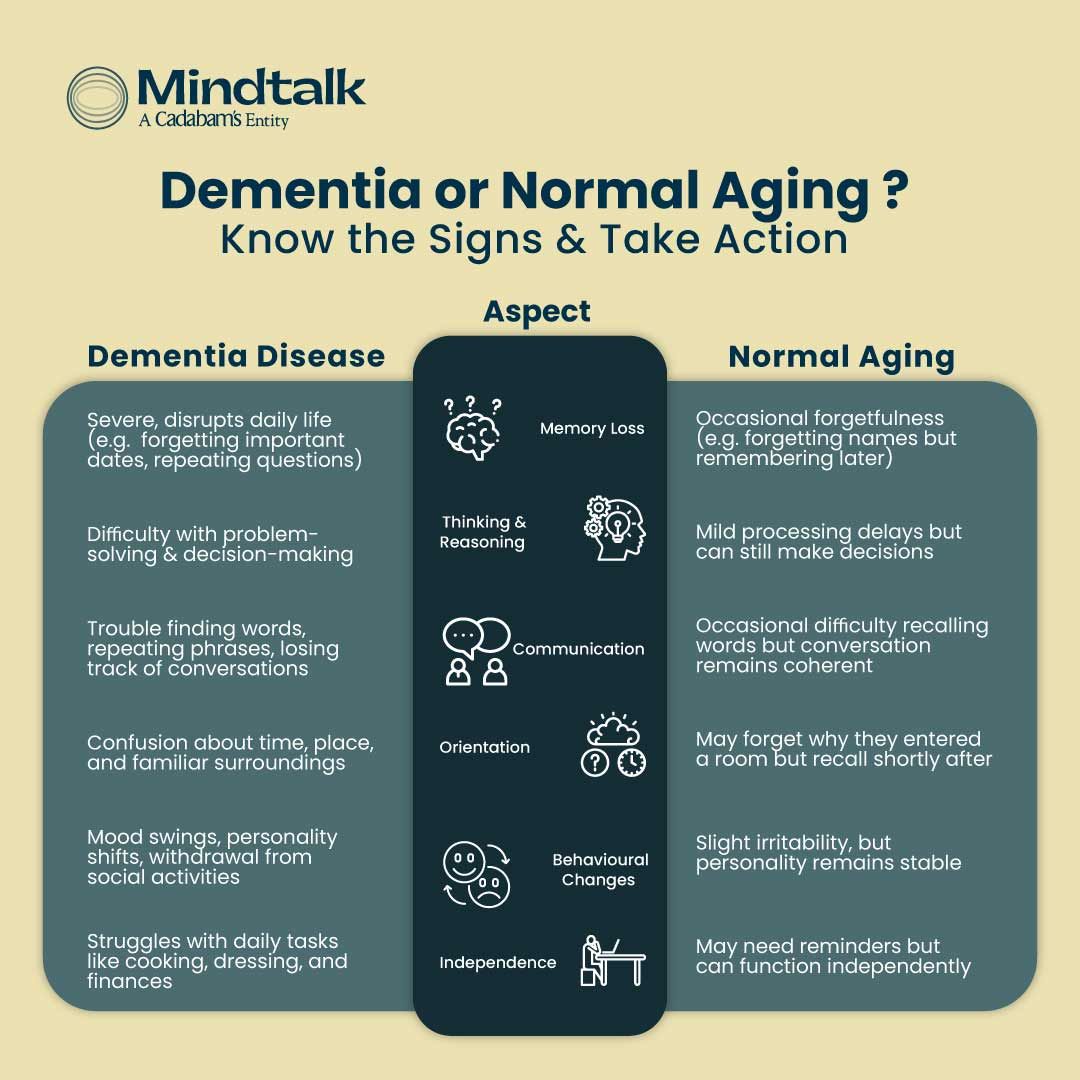
Dementia Symptoms
Memory loss and dementia present through a range of symptoms that may vary by stage but typically include:
- Short-term memory loss
- Difficulty concentrating or reasoning
- Confusion and disorientation
- Personality or mood changes
- Problems with language or communication
- Reduced ability to perform daily activities
These symptoms reflect cognitive impairment, and early recognition can help in managing dementia at home more effectively, improving safety, emotional wellbeing, and long-term care planning for both individuals and caregivers.
Early Signs of Dementia
- Memory Loss:
Forgetting recent conversations, events, or where you’ve placed familiar objects can be early indicators. This goes beyond occasional forgetfulness and becomes a pattern.
- Disorientation and Confusion:
Difficulty keeping track of time, dates, or your location may begin to occur. A person might get confused during familiar routines or struggle with planning tasks.
- Struggling with Daily Tasks:
Everyday activities like following a recipe or managing bills may become harder. The person may forget steps or complete tasks in the wrong order.
- Difficulty Finding Words:
Conversations may become difficult as the person struggles to find the right words or follow what others are saying.
- Mood and Behaviour Changes:
Irritability, anxiety, or unexplained sadness may surface. A person might become withdrawn or show less interest in social activities they once enjoyed.
Progressive Cognitive Decline
An advanced stage of dementia leads to reduced mental concentration and ability to absorb information. Those affected may develop problem-solving problems, make decisions, adapt to new situations, and become increasingly dependent on others to function.
Memory Loss and Confusion
As the degree of dementia increases, logical thinking in familiar surroundings becomes obsolete. Tasks such as paying bills or cooking can quickly become unbearably complicated.
Memory lapses can develop into a reduced ability to make decisions and carry out simple actions, resulting in those affected no longer being able to fulfil their daily duties.
Difficulty with Problem-Solving and Decision-Making
Making decisions becomes more and more complicated. Simple tasks like cooking or paying a bill become very difficult. For people with dementia, these simple tasks are almost impossible to get done.
Language and Communication Difficulties
It becomes difficult to find the right words, which leads to people repeating sentences or pausing in the middle of a sentence. It becomes difficult to follow conversations, which leads to frustration and social withdrawal.
Changes in Behaviour and Personality
Dementia can change your mood and personality. Some people become easily irritable, anxious or suspicious, while others act impulsively or display atypical behaviour in social situations.
Emotional and Mood Changes
Emotional regulation weakens, leading to sudden mood swings, depression, or apathy. People may lose interest in once-loved activities, experiencing heightened frustration or unexplained sadness.
Difficulty with Daily Activities and Routine Tasks
- Difficulty getting dressed, cooking or running the household independently.
- Forgetting the purpose of objects such as a toothbrush or kettle.
- They lose track of their personal hygiene and need help with daily care.
Impaired Perception and Coordination
Difficulty judging distances may lead to clumsiness or the enhanced likelihood of falling for the affected individuals. There is also a decline in manual coordination, thus affecting the performance of basic activities like the use of forks, spoons and pens.
Late-Stage Dementia Symptoms
In the advanced stage, those affected can no longer communicate, move independently or care for themselves. Constant care is required to ensure safety, comfort and pride.
Causes of Dementia
Alzheimer’s disease is the most common cause of dementia, resulting from abnormal brain protein build-up. Other causes include vascular dementia, due to reduced blood flow to the brain, and neurodegenerative disorders like Lewy body dementia.
These conditions damage brain cells over time, leading to cognitive decline. Prioritising brain health through lifestyle and medical care may delay progression and improve quality of life, especially when combined with early diagnosis, regular monitoring, and personalised care strategies.
Brain Cell Damage and Loss of Communication
Brain cells are compromised because of neurodegenerative conditions, altering neural communication.
This results in worsening cognitive loss, memory, and thought-processing difficulty, making everyday activities more demanding. The symptoms of dementia escalate as more cells are destroyed.
Damage to Different Brain Regions
Dementia disease affects specific brain regions responsible for memory, speech, and reasoning.
Damage to the frontal lobe alters behaviour, while hippocampal degeneration impacts memory recall, leading to dementia symptoms like confusion and disorientation.
Protein Build-Up in Alzheimer’s Disease
Abnormal accumulation of beta-amyloid plaques and tau tangles in the brain disrupts neural connections.
This process is a primary cause of Alzheimer’s dementia, leading to memory loss, impaired judgment, and personality shifts.
Memory Loss Due to Hippocampus Damage
The hippocampus, which stores memories, shrinks in the disease of dementia. This causes short-term memory loss, inability to form new memories, and confusion, which gradually gets worse with time, making independent living more challenging.
Dementia disease can be reversible or permanent, depending on the aetiology.
Permanent vs. Reversible Causes of Dementia
Dementia disease can be permanent or reversible, depending on the cause. Permanent dementia results from neurodegenerative conditions like Alzheimer’s dementia, while reversible causes include infections, nutritional deficiencies, or medication side effects.
Early dementia diagnosis and treatment can improve symptoms in cases where the condition is reversible.
Depression and Cognitive Decline
Chronic depression mimics early signs of dementia, causing forgetfulness, confusion, and disinterest in daily activities.
Unlike Alzheimer’s dementia, cognitive decline from depression can improve with proper treatment, therapy, and lifestyle changes.
Medication Side Effects
Certain medications, including sedatives and antidepressants, can cause memory loss and confusion.
Identifying medication-induced cognitive decline helps in differentiating dementia symptoms from side effects, ensuring the right adjustments in treatment.
Alcohol and Brain Health
Heavy alcohol intake results in alcohol-related dementia, with resulting memory impairment, poor judgment, and speech impairment.
Contrary to Alzheimer's dementia, a portion of cognitive impairment due to alcohol is reversible with early intervention.
Thyroid Problems and Dementia Risk
Untreated thyroid disorders may cause symptoms similar to dementia, but these include confusion, slowness of thinking, and forgetfulness.
A simple blood test will detect thyroid-related memory problems, which makes early diagnosis of dementia easier in excluding reversible causes.
Vitamin Deficiencies and Memory Issues
Vitamin B12, D, and folate deficiencies can damage brain function, leading to confusion, inability to concentrate, and forgetfulness.
Cognitive impairment due to nutritional deficiencies is reversible upon appropriate treatment.
When to See a Doctor for Dementia Patients?
Early signs of dementia should be recognised to enable early intervention. Consult a doctor if the following are experienced by a loved one:
- Persistent memory loss, affecting daily conversations and activities.
- Confusion about time, places, or familiar faces.
- Difficulty concentrating or making decisions in routine tasks.
- Noticeable personality changes, including mood swings or withdrawal.
Early dementia diagnosis and treatment can slow progression and improve long-term care outcomes.
Diagnosis of Dementia
A structured diagnostic approach helps differentiate dementia disease from other cognitive conditions, ensuring proper care.
Medical History and Initial Assessment
Doctors review family history, symptoms, and lifestyle factors to identify potential dementia causes.
Cognitive screening tests help assess memory, attention, and reasoning skills.
This first step in dementia diagnosis and treatment determines whether further neurological evaluations are necessary.
Physical Examination and Cognitive Testing
A comprehensive physical and cognitive examination assesses reflexes, balance, and problem-solving abilities.
Tests like the Mini-Mental State Examination (MMSE) or Montreal Cognitive Assessment (MoCA) measure memory, reasoning, and language skills, aiding in early dementia diagnosis.
Brain Imaging and Neurological Evaluations
Brain imaging like MRI, CT, and PET scans assist in the detection of structural or functional alterations associated with Alzheimer's dementia, vascular dementia, and other forms of dementia. These tests determine the causes of dementia, which informs proper treatment planning.
Challenges in Identifying Dementia Types
Differentiating dementia disease types can be difficult due to overlapping symptoms. Proper testing helps refine dementia diagnosis and treatment strategies.
Overlapping Symptoms Among Dementia Types
Symptoms like memory loss, confusion, and personality changes occur in multiple types of dementia, making accurate diagnosis complex.
Specialists assess subtle differences in progression and behaviour to determine the most appropriate dementia treatment plan.
Mixed Dementia and Co-Existing Conditions
Some patients exhibit characteristics of Alzheimer’s dementia and vascular dementia simultaneously.
Mixed symptoms complicate dementia diagnosis, requiring thorough testing to determine which factors contribute most to cognitive decline.
Differences in Symptom Progression
Dementia stages vary based on the underlying cause. While Alzheimer’s dementia progresses gradually, vascular dementia may worsen suddenly.
Recognising progression patterns helps tailor dementia treatment in India and worldwide.
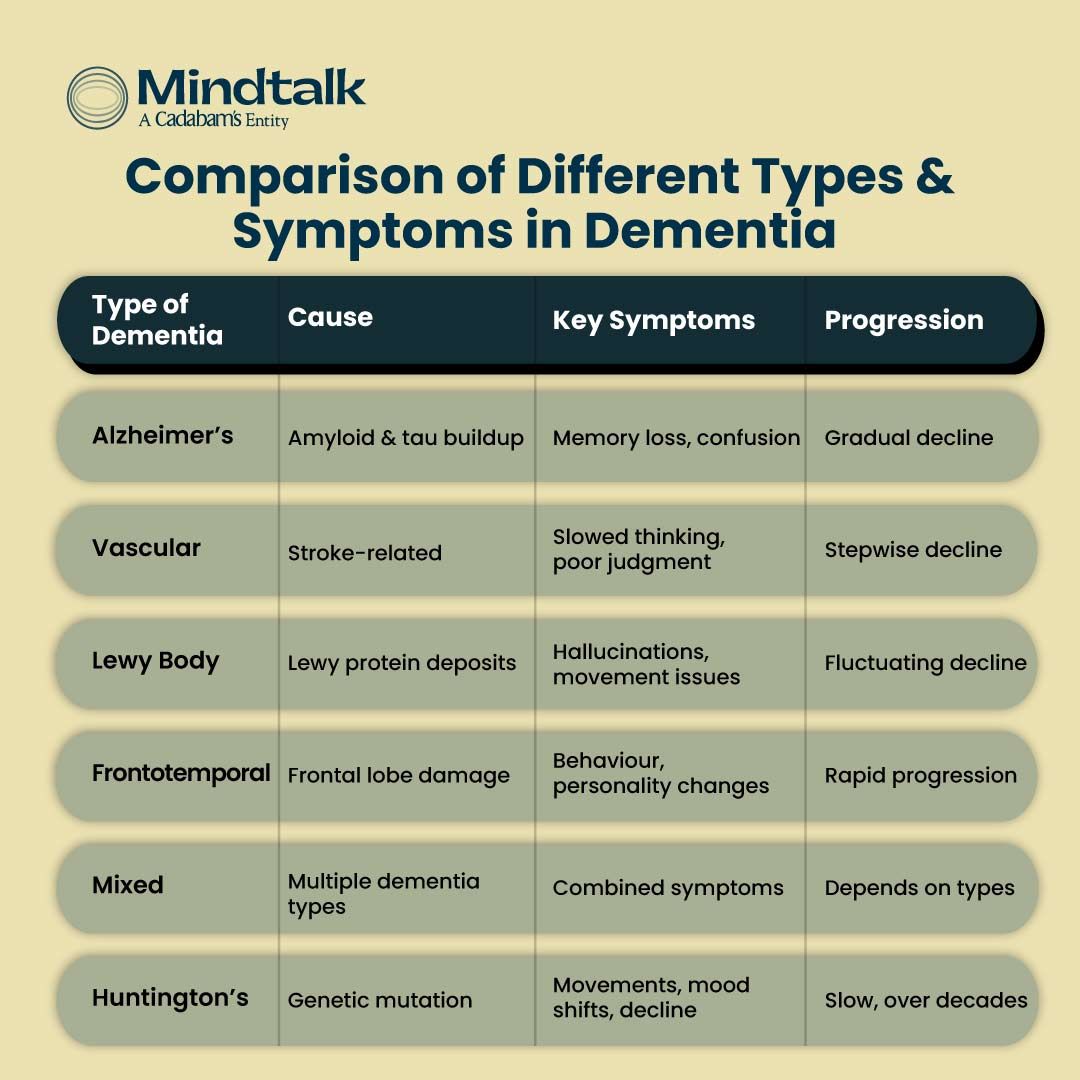
Dementia Treatment and Care in India
Access to dementia treatment in India is improving, with diverse medical and therapeutic care options available.
Medication Management for Symptom Control
While there is no cure for dementia, certain medications help manage symptoms. Cholinesterase inhibitors improve memory, while NMDA receptor antagonists regulate brain function.
Dementia treatment also includes antidepressants, antipsychotics, or sleep aids, depending on patient needs.
Therapy for Dementia Patients: Cognitive and Behavioural Support
Interventions such as cognitive stimulation therapy (CST), memory therapy and behavioural interventions help people with dementia to maintain their cognitive abilities and cope with emotions.
Individualised therapy sessions improve everyday interactions, communication and social engagement.
Specialised Dementia Care Programs
Tailored programs provide structured routines, memory-enhancing activities, and caregiver education, supporting dementia patients through each stage of their condition.
In-Clinic Dementia Treatment Services
Hospitals and memory care centres offer supervised treatment plans, including cognitive rehabilitation, medication adjustments, and mental health support, improving outcomes for dementia patients in controlled environments.
Home-Based Support and Guidance for Families
Home-care services help families manage daily care routines, cognitive exercises, and emotional support, ensuring dementia patients remain comfortable and engaged in familiar surroundings.
Memory Care Therapy and Rehabilitation
Rehabilitation programs focus on sensory stimulation, music therapy, and structured cognitive activities, helping dementia patients maintain cognitive abilities and emotional well-being for as long as possible.
Managing Dementia at Home
Managing dementia at home involves both routine and flexibility. Key strategies include:
- Establishing consistent daily routines
- Using memory aids and assistive devices
- Ensuring safety with home modifications
- Encouraging social engagement
- Accessing caregiver support groups
These measures help reduce distress and improve quality of life. Families play a central role, and professional guidance can further support long-term care goals, prevent caregiver burnout, strengthen emotional resilience, and ensure continuity of care through evolving stages of dementia.
What Are the Risk Factors for Dementia?
Dementia arises from a combination of unchangeable and modifiable risk factors. Understanding these elements is crucial for early detection and implementing preventive measures to mitigate the progression of cognitive decline.
Age
- The biggest risk factor—dementia risk increases significantly after age 65.
- Although not a direct cause, ageingaging leads to brain changes that contribute to cognitive decline.
Family History
- A family history of Alzheimer’s dementia or other types of dementia raises the risk.
- Genetic predisposition can make individuals more susceptible, though lifestyle choices also play a role.
Down Syndrome
- Individuals with Down Syndrome have a higher risk of early-onset Alzheimer’s dementia.
- The genetic condition leads to excessive amyloid plaque buildup, a key factor in dementia progression.
Race and Ethnicity
- Some ethnic groups, including African American and Hispanic populations, have a higher dementia risk.
- This is linked to disparities in healthcare, cardiovascular health, and genetic predisposition.
Poor Heart Health
- High blood pressure, cholesterol, and diabetes increase the risk of vascular dementia.
- Maintaining cardiovascular health can lower the chances of dementia-related brain damage.
Brain Injury
- Head trauma from accidents or sports increases dementia risk, especially chronic traumatic encephalopathy (CTE).
- Repeated concussions or severe injuries accelerate cognitive decline later in life.
Lifestyle Factors
- Smoking, excessive alcohol consumption, poor diet and lack of exercise all contribute to the risk of dementia.
- A healthy lifestyle for the brain, including regular mental stimulation, reduces the risk of cognitive decline.
Strategies to Prevent Dementia
While there is no cure for dementia, adopting healthy habits can reduce the risk and support long-term cognitive health.
Understanding Dementia Risk
- Knowing risk factors like age, genetics, and lifestyle choices helps in prevention.
- Early action—through diet, exercise, and cognitive engagement—can slow cognitive decline.
Healthy Lifestyle Choices
- A diet rich in omega-3s, antioxidants, and whole foods supports brain health.
- Limiting processed foods, sugar, and alcohol reduces inflammation linked to dementia disease.
Keep Your Brain Engaged
- Reading, puzzles, and learning new skills strengthen cognitive function.
- Hobbies that challenge thinking—like playing an instrument or speaking a new language—help maintain memory.
Physical Exercise
- Regular aerobic exercise, such as walking or swimming, promotes brain circulation.
- Strength training and balance exercises help prevent falls and injuries that may accelerate cognitive decline.
Being Socially Active
- Meaningful interactions reduce loneliness, a major dementia risk.
- Community activities, volunteering, or social groups improve emotional well-being and delay dementia symptoms.
Living with Dementia – Support for Patients & Caregivers
Caring for someone with dementia disease requires patience, adaptation, and emotional support. Small changes in daily routines can improve the quality of life for both dementia patients and caregivers. Establishing predictable schedules, simplifying tasks, and creating a calming environment can reduce anxiety and help individuals with dementia feel more secure and supported.
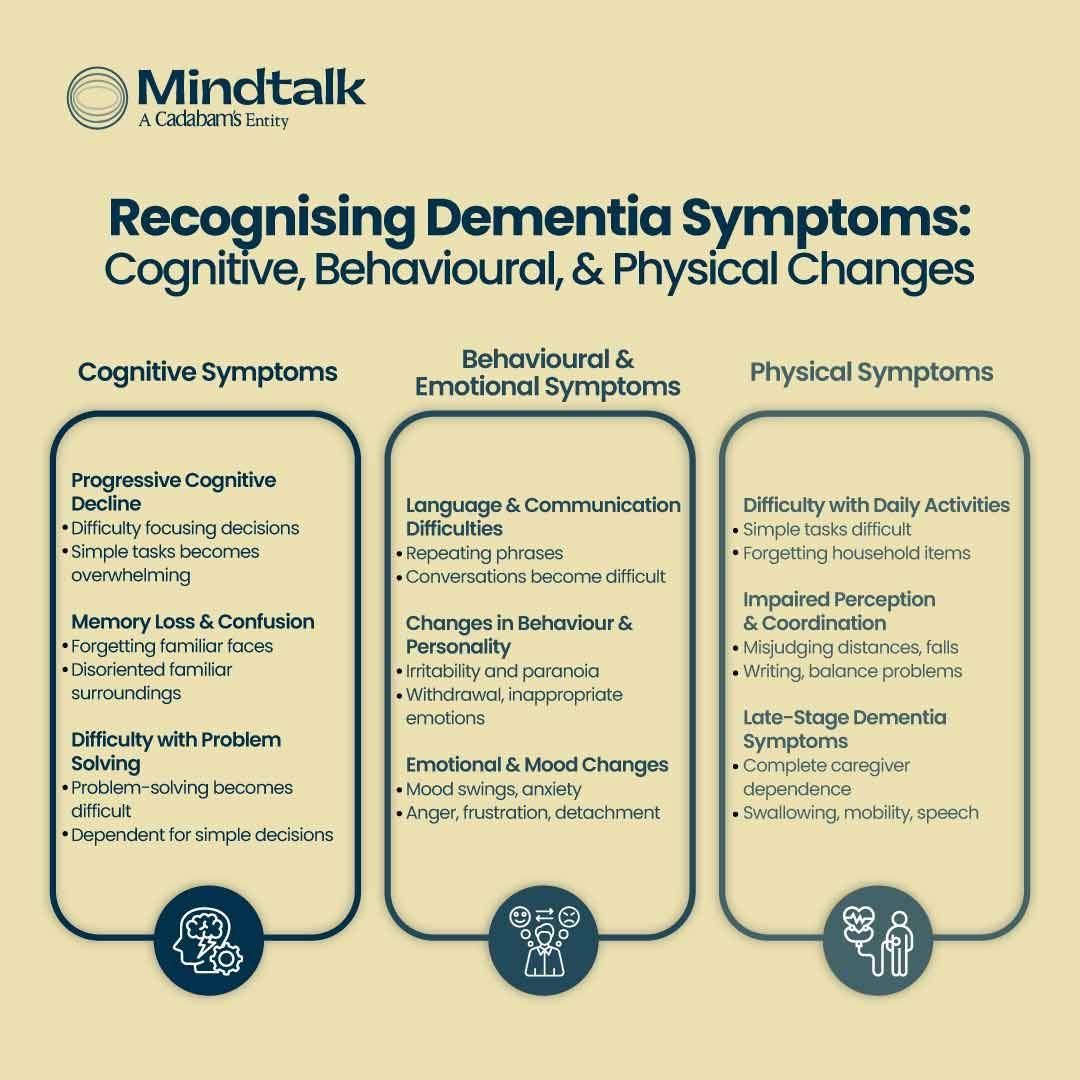
How to Communicate with Someone with Dementia
Communication challenges increase as dementia symptoms progress. Using simple, reassuring language and non-verbal cues can make interactions smoother and reduce frustration for both the patient and caregiver. Maintaining eye contact, speaking slowly, and offering visual prompts can enhance understanding and create a more positive and meaningful connection during conversations.
Get Personalised Dementia Treatment Solutions at Mindtalk
Specialist care makes all the difference in managing dementia. Mindtalk provides personalised therapy, cognitive rehabilitation and support for carers to ensure a holistic approach to dementia care.
Early intervention can improve daily functioning and emotional well-being. Connect with Mindtalk for Expert Dementia Support Today!
If you're seeking solutions for emotional and mental well-being, Mindtalk’s Dementia Therapists are here to help. Our platform offers comprehensive mental health services, including counselling, therapy, and psychiatric care, provided by specialised experts. With a focus on evidence-based and holistic approaches, we support your path to personal growth and healing. Reach out to us today to book a therapy session. Call us at +91 73534 00999.
